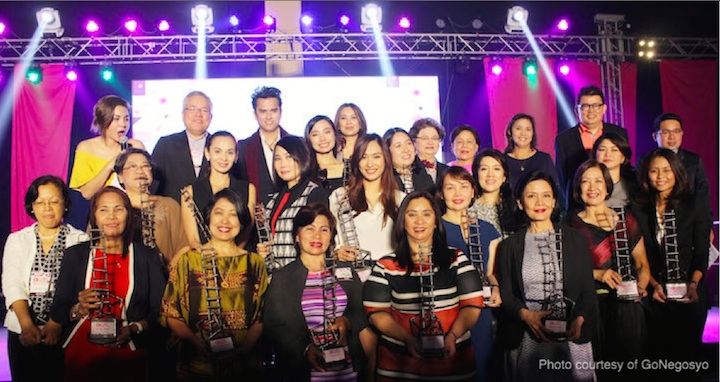Link: http://www.wheninmanila.com/8-nuggets-of-wisdom-from-gonegosyo-2016-inspiring-filipina-awardees/
BY SUZY TAPARAN, MARCH 11, 2016
Star-studded lineup. Check. Free entrance for students and teachers. Check. Audience by the droves. Check.
These are what defined GoNegosyo’s Filipina Entrepreneurship Summit for the last eight years. This year, though, GoNegosyo outdid itself: in its 10 years of existence, GoNegosyo had just pulled in its biggest crowd—a reported 11,000 strong— for a day full of inspiration.
As a post-mortem, we, too, take inspiration not from the power cast of celebrity-speakers but from the GoNegosyo Inspiring Filipina Awardees this year.
Here, seven out of the 18 awardees share their lessons as entrepreneurs. They talk about mistakes, failures, weaknesses and, in the process, their resilience.
8. On the lack of startup capital: 2015 Citi Microentrepreneurship National Awardee (CMA) Lydia Malot started her nata de coco business with a P300 initial capital while working as a teacher by day. Like most microentrepreneurs, her main challenge was funding. “Pinagtiyagaan ko. Ano mang maliit na kita ay ibinabalik ko bilang puhunan (I persevered. Whatever profit I earned, no matter how small, I ploughed back into my business),” was her time-tested formula. Today, she owns a business with a reported net worth growth of P900,000 and has 15 workers.
7. On perseverance in the midst of failures: 2014 CMA awardee Teresita Valdez, a bagoong manufacturer, also knows all about resilience first-hand. This microentrepreneur had her liquidity issues stemming from business partnership breakups, outstanding receivables in the millions of pesos, and rejected deliveries early on. It took around 14 years from the time she and her husband decided to strike on their own to finally say that they now have a sustainable business in their hands.
6. On innovation and competition: “When the trend was to go back to all natural products, everyone was turning to virgin coconut oil,” said Sherill Quintana, owner of Oryspa Spa Solutions. “We, however, pioneered the use of rice bran as a superior topical oil and wellness product. It is a blue ocean strategy. You can only be the leader if you are a trail blazer and not a copycat.”
5. On repeated failures: “I believe in the intelligent fast failure theory in technology and innovation,” Sherill explained. “That is, the faster you fail, the faster you perfect a system because you tend to scrutinize what made you fail and adjust your systems each time. I view failure as an opportunity to learn.”
4. On teaching one’s child how to handle failures: “Parents should explain to their children that failure doesn’t define them as persons,” said Rossana Llenado of AHEAD Learning Inc.
Rowena Matti, CEO of Galileo Enrichment Learning Program, Inc., sees nothing wrong with letting children experience disappointments. “As parents, we need to guide our children on how to manage setbacks. We can’t always shield them from every little setback and failure, but we should know when to step in,” she said.
3. On the role of Science and Math in business: “Math and science education can develop one’s problem solving, critical thinking, analytical, organization and analytical skills— skillsets that are essential in business,” Rowena said. “But the quality of our nation’s math education, judging from the low national achievement scores of Filipino students, still needs to improve.”
The statement is further validated by her own experience with teachers who apply with her organization. “Many of these candidates failed our company’s Math and English diagnostic exams. Such is indicative of their kind of formal education. This is the main reason we invest a lot in the training of every teacher who joins our organization.”
2. On being an employee turned employer: Evelyn Lao-Yap was an employee before she started her distribution company, Benby Enterprises. Those three years as employee had honed her on certain skills. “Whatever success I experienced when I was an employee, I brought that confidence with me as an employer. I applied the discipline I learned as an employee on how to conduct myself during meetings, how to analyze situations and how to find solutions, to my own business,” she said.
1. On making decisions: Adelfa Borro, whose family owns Ted’s Old Timer Lapaz Batchoy, shared, “In the past, I had made business decisions that were based on gut feel alone. For instance, for prospective spaces for my branches, I relied solely on property developers’ market projections and recommendations. These decisions proved to be costly, so I now learned to study the market myself before I put my stamp of approval on what others recommend to me.”


Recent Comments